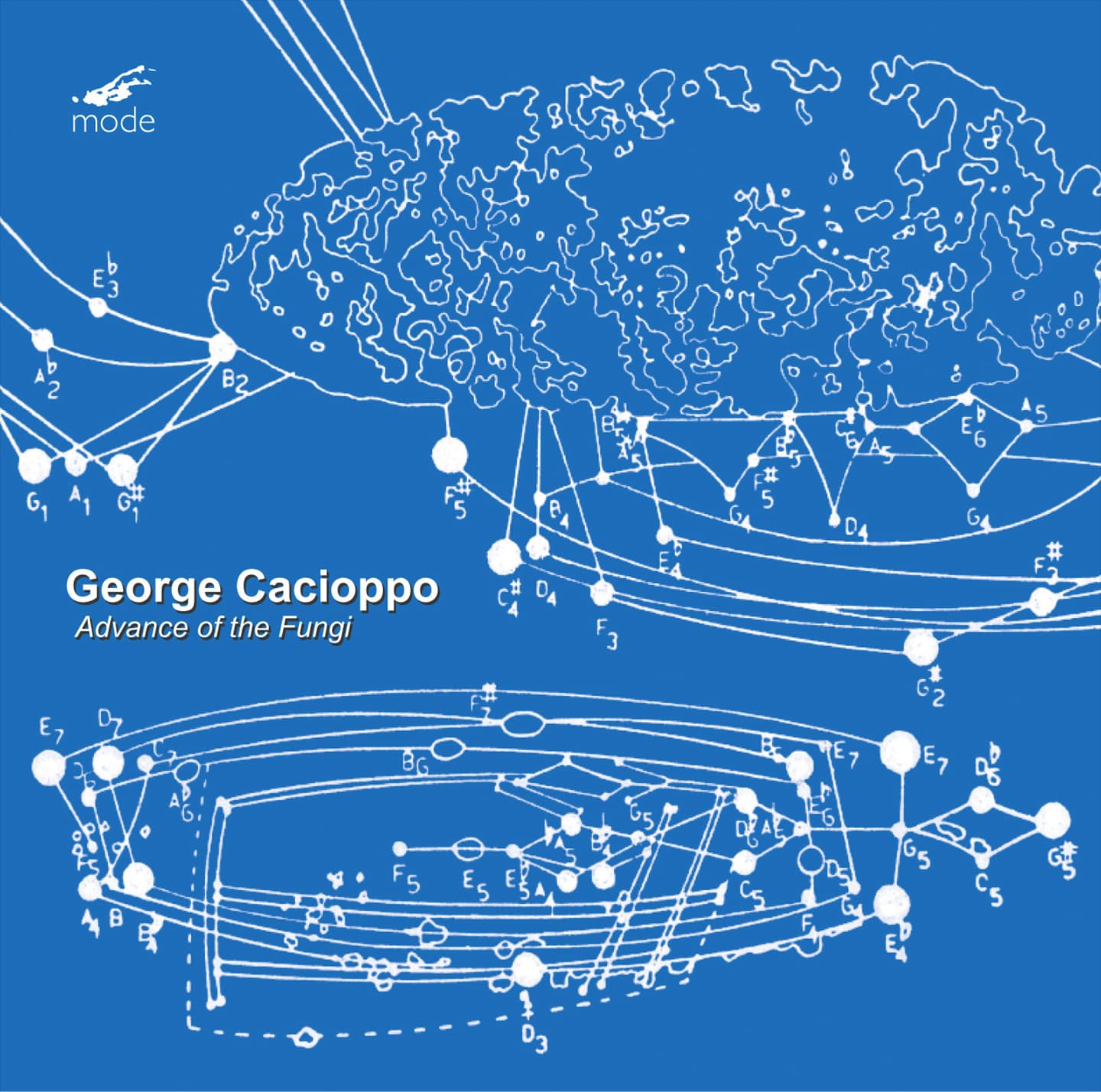Advance of the Fungi
Includes program notes by Gordon Mumma, Paul Méfano, Gerard Pape, and George Cacioppo in English, French, and German on insert. Text to the 6th work by Rilke. The 1st work for soprano, 2 horns, 2 trombones, piano, violoncello, and percussion; the 2nd work for flute, percussion, and double bass; the 3rd work for electric organ; the 4th work for male choir, 3 clarinets, 3 trombones, 2 horns, and percussion; the 5th work for soprano, flute, oboe, piano, percussion, violin, viola, violoncello, and double bass; the 6th work for soprano, piano, and 5 percussion. (viewed Feb. 7, 2013). Janet Pape (1st and 6th works), Sevan Manoukian (5th work), soprano ; Nicholas Isherwood (4th work), bass ; George Cacioppo (3rd work), electric organ ; Ensemble 2e2m (1st-2nd, 5th works) ; Atelier de Musique Contemporaine du CNR de Versailles (4th and 6th works) ; Paul Mefano (1st and 5th works), Renaud Francȯis (4th work), Lionel Arnaud (6th work), conductor. The 1st, 2nd, and 5th works recorded at the Atrium Theater, Chaville, France; the 4th work recorded at the CNR de Versailles, France; the 3rd work recorded in Ann Arbor, Michigan in 1966; the 6th work recorded at the CNR de Versailles, France, Mar. 26, 2004. Previously released as a compact disc.
Time on Time in Miracles (1965) (7:19)
for soprano, 2 horns, 2 trombones, piano, cello & percussion
Janet Pape, soprano
Ensemble 2e2m
Paul Méfano, conductor
Mod 3 (1963) (5:24)
for flute, percussion & contrabass
Ensemble 2e2m
Holy Ghost Vacuum or America Faints (1966) (25:57)
George Cacioppo, electric organ
Advance of the Fungi (1964) (13:57)
for male choir, 3 clarinets, 3 trombones, 2 horns, & 1 percussion
Nicholas Isherwood, bass voices
Atelier de Musique Contemporaine du CNR de Versailles
Renaud François, conductor
Two Worlds (1962) (7:58)
for soprano, flute, oboe, piano, percussion, violin, viola, cello & contrabass
Sevan Manoukian, soprano
Ensemble 2e2m
Paul Méfano, conductor
Bestiary 1: Eingang (1960) (8:12)
for soprano, piano & 5 percussionists
Janet Pape, soprano
Atelier de Musique Contemporaine du CNR de Versailles
Lionel Arnaud, conductor
The music of George Cacioppo (1927-84) is important in the history of 20th century music composition as the missing link between the American “sound based” music of the 1960s with the “sound centered” music of Giacinto Scelsi and his disciples, the French spectral composers, Tristan Murail and Gérard Grisey.
Critical of serial music and academicism’s failure to take into account the nature of sound itself, Cacioppo was inspired by radical composers such as Varèse, Cage and Feldman, and produced the American equivalent of the “sound centered” compositions of Giacinto Scelsi in Italy.
Cacioppo created a distinctly new “sound based” approach to harmony where there is a continuous transformation of “pure” tones into clusters and then into “noise”, or the contrary.
On the other hand, Cacioppo treats time in a very supple manner – the temporal flow is rather slow and unmeasured in order to allow his sounds to breathe as freely as possible, or as Cage said “to let the sounds be themselves”.
This marks the first collection on CD of Cacioppo’s unique music, in recent recordings by leading French soloists and ensembles; PLUS a rare chance to hear Cacioppo perform one of his own pieces.
Liner notes by Cacioppo’s colleague Gordon Mumma and Gerard Pape.
Reviews
George Cacioppo
Advance of the Fungi
Mode 168
Mention was made above of New World’s Music from the ONCE Festival 1961-1966 box, and those wise souls who invested in a copy will remember George Cacioppo (1926-1984) as one the lesser known members of the ONCE group (the list also includes Donald Scavarda, Bruce Wise, Philip Krumm and George Crevoshay). The release of six Cacioppo works on Mode is good news indeed, then, even if four of them – Time On Time in Miracles (1965), Advance of the Fungi (1964), Two Worlds (1962) and Bestiary I: Eingang (1960), already featured in the New World box (in any case, these smart new readings by the Ensemble 2e2m and the Atelier de Musique Contemporaine du CNR de Versailles make for an intriguing comparison with the archive recordings from Ann Arbor). The disc also includes Mod 3 (1963), for flute, percussion and double bass, and Holy Ghost Vacuum or America Faints (1966), a wonderfully lugubrious 26-minute exploration of the electric organ recorded by the composer himself back in 1966.
In the characteristically thorough liner notes, which also include an affectionate profile of Cacioppo by Gordon Mumma, Gerard Pape describes Cacioppo’s music as “the missing link between American ‘sound-based’ music of the 1960s with [sic] the ‘sound-centred’ musics of Giacinto Scelsi and his disciples, the French spectral composers Tristan Murail and Gérard Grisey.” Leaving aside the woolly terms “sound-based” and “sound-centred” (which were discussed in these pages last month), and the rather debatable assertion that Murail and Grisey were Scelsi “disciples”, Pape does have a point. Cacioppo’s music is intensely focused on the inner workings of sound, and avoids fast moving displays of technical virtuosity à la Boulez in favour of slow, spacious writing. But his music owes much to Varèse too, and the mastery of the melodic line and sensitivity to the interval has more in common with early 20th century music than with the often uneven semi-improvised fantasias of Scelsi. Cacioppo’s vocal writing is also excellent (not something that can always be said of the Italian), for both solo voice – Janet Pape’s work on Time on Time and Bestiary is gorgeous – and chorus, in the sombre title track. George Cacioppo’s career as a composer was brief, and his life was dogged by health problems which led eventually to his death, but he left us with some of the most elegant and original American music of the post-War years, and it deserves to be much more widely known and performed. Make sure you check this out.
— Dan Warburton, Paris Transatlantic Review, December 2006

